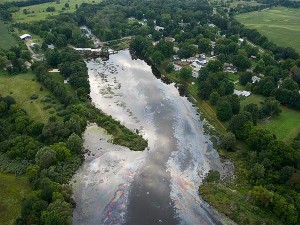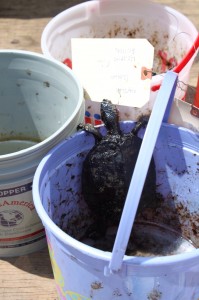We have much more to do and your continued support is needed now more than ever.
Breaking News: Enbridge Fined $3.7 Million for 2010 Tar Sands Oil Spill
The U.S. Department of Transportation Pipeline and Hazardous Materials Safety Administration (PHMSA) has announced yesterday that it is issuing $3.7 million in civil penalties and 24 enforcement actions against Enbridge Energy for the 2010 tar sands oil spill into the Kalamazoo River watershed.
PHMSA’s press statement noted:
“PHMSA’s investigation found multiple violations of its hazardous liquid pipeline safety regulations related to integrity maintenance, failure to follow operation and management procedures, and reporting and operator qualification requirements. PHMSA issued its notice and proposed civil penalty to Enbridge in a Notice of Probable Violation.”
All of this happens while Enbridge is trying to double (and perhaps triple) the amount of tar sands oil that pumps through the very pipeline that burst two years ago.

Enbridge Waited 17 Hours After Spill to Shut Off Pipeline
PHMSA noted that 17 hours had passed since alarms warned Enbridge of an issue and they officially shut off Line 6B. Regardless of the alarms, Enbridge still had to be told, by a local utility, that a spill had occurred. In those 17 hours, Enbridge continued to try and pump more and more tar sands oil through their line as a way to override the alarms.
PHMSA also confirmed that Enbridge knew of large defects on the pipeline years before this incident occurred.
Does this sound like a company that should be allowed to operate a pipeline in one of the largest freshwater resources on earth, let alone be allowed to expand the very pipeline that burst?
For the past year, Enbridge has been using this disaster to manipulate the public and the State of Michigan into thinking they are replacing this line because they want to make it safer. This tactic is a bold-faced lie to the public impacted by the spill and to the regulators left to determine its future. Enbridge is in fact replacing Line 6B so that they can expand to pump even more tar sands oil through our state, the Great Lakes, and through our country—for export.
It is critical that our lawmakers and federal agencies understand what Enbridge is trying to do with this expansion and hold Enbridge 100% accountable for what has happened in Marshall, Mich.
To date, they have literally gotten away with killing hundreds of wildlife, putting people’s health at risk and destroying very sensitive habitat for years to come. While $3.7 million is the largest fine issued by PHMSA, it is merely a drop in the bucket compared to Enbridge’s bottom line, especially when you consider their future plans.

Regulators: Watch Enbridge Like a Hawk
The Michigan Public Service Commission should deny all permits put forward by Enbridge Energy, federal agencies need to review this project in its entirety, and the current line needs to be shut down until proper pipeline safety laws are developed that address how Enbridge was allowed to have a spill of this size.
In addition, any other pipeline that Enbridge operates, including Line 5 that runs under the Straits of Mackinaw, needs to have a thorough investigation into its integrity (by a third party) before Enbridge is allowed to continue operation. Without a doubt, this company should not be allowed to expand any of their pipelines.
The Great Lakes are a treasure to Americans and the world. Congress has confirmed this by investing over $1 billion into restoration initiatives. We cannot afford to allow companies, like Enbridge Energy, to risk it all at their own discretion.
Keep checking Wildlife Promise for the latest on these developing issues and please speak out for wildlife impacted by tar sands development.





















